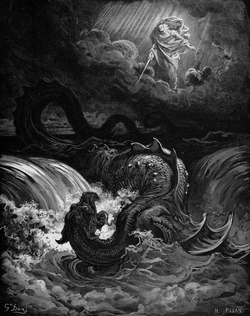
Back Leviatan Afrikaans لوياثان Arabic Leviafan Azerbaijani Левіяфан Byelorussian Левиатан (Библия) Bulgarian Levijatan BS Leviatan Catalan Leviatan Czech Lefiathan Welsh Livjatan (havuhyre) Danish

The Leviathan (/lɪˈvaɪ.əθən/ liv-EYE-ə-thən; Hebrew: לִוְיָתָן, romanized: Līvyāṯān; Greek: Λεβιάθαν) is a sea serpent noted in theology and mythology. It is referenced in several books of the Hebrew Bible, including Psalms, the Book of Job, the Book of Isaiah, and the pseudepigraphical Book of Enoch. The Leviathan is often an embodiment of chaos, threatening to eat the damned when their lives are over. In the end, it is annihilated. Christian theologians identified Leviathan with the demon of the deadly sin envy. According to Ophite diagrams, the Leviathan encapsulates the space of the material world.
The Leviathan of the Book of Job is a reflection of the older Canaanite Lotan, a primeval monster defeated by the god Baal Hadad.[1][2] Parallels to the role of Mesopotamian Tiamat defeated by Marduk have long been drawn in comparative mythology, as have been wider comparisons to dragon and world serpent narratives such as Indra slaying Vrtra or Thor slaying Jörmungandr.[3] Leviathan also figures in the Hebrew Bible as a metaphor for a powerful enemy, notably Babylon (Isaiah 27:1). Some 19th-century scholars pragmatically interpreted it as referring to large aquatic creatures, such as the crocodile.[4] The word later came to be used as a term for great whale and for sea monsters in general.
- ^ Charles F. Pfeiffer "Lotan and Leviathan"
- ^ Mark R. Sneed "The Israelite Reconfiguranion of the Canaanite Combat Myth: Leviathan" in: "Taming the beast : a reception history of Behemoth and Leviathan", De Gruyter, Berlin, 2022.
- ^ Cirlot, Juan Eduardo (1971). A Dictionary of Symbols (2nd ed.). Dorset Press. p. 186.
- ^ Gesenius, Wilhelm (1879). Hebrew and Chaldee lexicon to the Old Testament. Translated by Tregelles, Samuel Prideaux.
© MMXXIII Rich X Search. We shall prevail. All rights reserved. Rich X Search